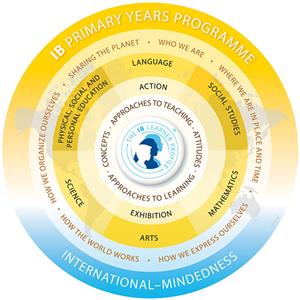-
Primary Years Programme
Introduction to the Primary Years Programme (PYP)

The Primary Years Programme (PYP) focuses on the heart as well as the mind and addresses social, physical, emotional and cultural needs as well as academic ones. At the heart of PYP is a commitment to structured inquiry as a vehicle for learning. Six transdisciplinary themes help teachers and children explore knowledge in the broadest sense of the word. Teachers and students use key questions that are concept based to structure the units of inquiry. They acquire and apply transdisciplinary skills while developing an understanding of these important concepts. The development of explicit attitudes and the expectation of socially responsible behavior are also essential elements of the program.
The Five Essential Elements of the Primary Years ProgramTo achieve a balance in learning, the PYP emphasizes the five parts of the curriculum which are called the Essential Elements of the curriculum. These five elements are concepts, knowledge, skills, attitudes and action.
I. Concepts :
The PYP has constructed a set of eight key concepts which answer the question- What do we want the students to learn?
Questions in each unit of inquiry can fit into one of these key concepts:- Form
- Function
- Causation
- Change
- Connection
- Perspective
- Responsibility
- Reflection
II. Knowledge :
What do we want the children to know? In answering this question, the program of inquiry is organized into six theme units. The following transdisciplinary themes provide the framework for the content of the program:
PYP Transdisciplinary Themes –
1. Who we are – An inquiry into the nature of the self; beliefs and values; personal, physical, mental, social and spiritual health; human relationships including families, friends, communities, and cultures; rights and responsibilities; what it means to be human.
2. Where we are in place and time – An inquiry into orientation in place and time; personal histories; homes and journeys; the discoveries, explorations and migrations of humankind; the relationships between and the interconnectedness of individuals and civilizations, from local and global perspectives.
3. How we express ourselves – An inquiry into the ways which we discover and express ideas, feelings, nature, culture, beliefs and values; the ways in which we reflect on, extend and enjoy our creativity; our appreciation of the aesthetic.
4. How the world works – An inquiry into the natural world and its laws; the interaction between the natural world (physical and biological) and human societies; how humans use their understanding of scientific principles; the impact of scientific and technological advances on society and on the environment.
5. How we organize ourselves – An inquiry into the interconnectedness of human-made systems and communities; the structure and function of organizations; societal decision-making; economic activities and their impact on humankind and the environment.
6. Sharing the planet – An inquiry into rights and responsibilities in the struggle to share finite resources with other people and with other living things; communities and the relationships within and between them; access to equal opportunities; peace and conflict resolution.III. Skills :
What we want the students to be able to do is addressed in the transdisciplinary skills within the units of inquiry. The construction of meaning and, therefore, understanding is complemented by the students' acquiring and applying a range of skills. These skills are:- Social skills
- Thinking skills
- Research skills
- Communication skills
- Self-management skills

